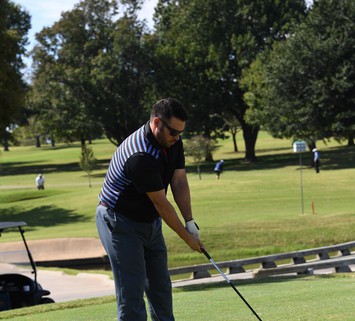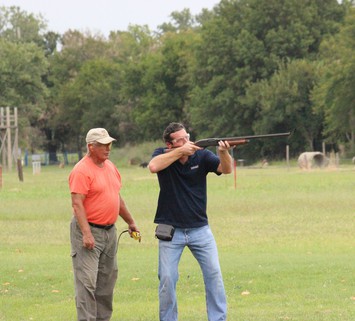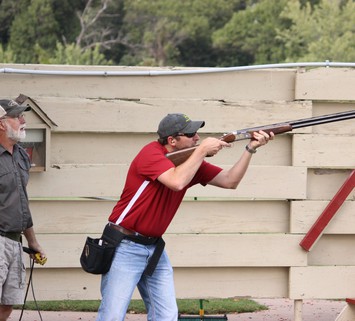By: __________________ ___B. ____
A BILL TO BE ENTITLED
AN ACT
relating to the licensing and regulation of petroleum landmen
BE IT ENACTED BY THE LEGISLATURE OF THE STATE OF TEXAS:
SUBCHAPTER A
SECTION 1. The Texas Occupation Code is amended by adding Section 1072.
SECTION 2. Section 1072.001. Short Title.
The chapter may be cited as the Petroleum Landman Practices Act.
SECTION 3. Section 1072.002. Definitions.
In this chapter,
(1) Board means the Texas Board of Petroleum Landmen.
(2) Landwork means:
(a) Negotiating with property owners for the acquisition or
divestiture of mineral rights;
(b) Negotiating business arrangements for exploring for
and development of minerals;
(c) Determining ownership in minerals through the
research of public and private records;
(d) Managing rights or obligations derived from
ownership of minerals; and
(e) Unitizing or pooling mineral interests.
(3) AAPL means the American Association of Professional
Landmen.
(4) Licensed Landman means an individual engaged in
Landwork and licensed under this Act.
(5) Registered Landman (RL) means an individual engaged in
Landwork and so designated by the Board and approved by the Board to conduct
landwork under the guidance of a Certified Professional Landman or a Registered
Professional Landman.
(6) Registered Professional Landman means an individual
engaged in landwork and so designated by the Board.
(7) Certified Professional Landman means an individual
engaged in landwork and so designated by the Board.
(8) Land Professional means one engaged in the practice of any
of (a) through (e) above.
SUBCHAPTER B
SECTION 4. Section 1072.010.
The Texas Board of Petroleum Landmen shall be subject to Chapter 325,
Government Code (Texas Sunset Act).
SECTION 5. Section 1072.011. Board membership.
(a) The Board will consist of seven members appointed by the
Governor with the advice and consent of the Senate. The Board shall be made up of
five Certified Professional Landmen and two public members.
(b) Public members or their spouses may not be engaged in Landwork,
own more than ten percent (10%) interest in any business performing Landwork or be
employed by any business engaged in Landwork.
SECTION 6. Section 1072.012. Term of Office, Oath, Vacancy.
(a) Board members will serve staggered six-year (6) terms with two or
three of those members’ terms expiring on January 31 of each odd-numbered year.
(b) A board member may not serve more than two (2) consecutive
terms.
(c) Before assuming the dates of office, the Board members must take
and file with the Secretary of State a copy of their oath of office.
(d) The Governor shall fill any vacancy pursuant to the same
qualifications of an initial applicant.
SECTION 7. Section 1072.013. Officers.
(a) The Governor shall select a presiding officer for a two-year (2)
term.
(b) The Board shall select an assistant presiding officer at its first
meeting. He will serve a two-year (2) term.
SECTION 8. Section 1072.014. Grounds for Removal.
(a) If not qualified at the time of swearing in or becomes disqualified
while serving.
(b) Cannot continue serving because of illness or disability.
(c) Unexcused absences of more than one-half of the regularly
scheduled board meetings during any one calendar year.
SECTION 9. Section 1072.015. Per Diem.
Each board member is entitled to receive a legislatively set per diem
allowance for each day the member engages in official board duties, including travel.
SUBCHAPTER C
SECTION 10. Section 1072.100.
(a) The Board shall hire persons as necessary to properly perform the
Board’s work under this chapter.
(b) With the advice of the Attorney General of Texas, the Board shall
enter into an agreement with AAPL to conduct the licensing process for each landman;
administer testing, maintain records and consult freely with the Board regarding
standards, quality control and improvements. The licensing process must be reviewed
and approved by the Board in consultation with AAPL. Any amendments to AAPL’s
process must be approved by the Board in consultation with AAPL.
(c) Subject to further clarification by the Board, each applicant for a
landman’s license will be required to have a four-year degree from a regionally
accredited university and in order to maintain the license will be required to obtain 10
hours of related continuing education per year and abide by the Code of Ethics and
Standards of Practice shown below.
(d) The Board shall adopt rules to implement and define the policies of
the Board and this statute.
(e) A license issued by the Board shall remain active and valid as long
as the licensee pays an annual renewal fee to the Board, maintains the required
continuing professional education, follows the Code of Ethics and Standards of Practice
(enumerated below), and is not revoked, suspended, or denied by the Board.
SUBCHAPTER D
SECTION 11. Section 1072.200. Disciplinary Action.
(a) The Board may revoke, suspend, refuse to grant, or review or place
a license on probation if it determines that the licensee commits one or more of the
actions:
(1) use of fraud or deceit to obtain a license;
(2) a finding by the Board of incompetence, misconduct, fraud,
gross negligence, or serious acts of negligence in performing land work;
(3) conviction of a felony or crime involving moral turpitude;
(4) a violation of this act or rules promulgated by the Board;
(5) a violation of the Code of Ethics or Standards of Practice;
(6) publicly practicing Landwork without a license granted under
this act.
(b) A hearing held pursuant to this Act shall be conducted by an
Administrative Law Judge retained by the Board. No licensee shall be revoked,
suspended, or placed on probation prior to a hearing before an Administrative Law
Judge.
(c) No person shall practice Landwork without a license issued by the
Board except:
(1) for personal business;
(2) when acting in an administrative capacity and not negotiating
with the public.
(d) Attorneys licensed by the State Bar of Texas are exempt from this
licensing requirement. Landmen or Land Professionals licensed in other states with
which the Board reaches a reciprocity agreement shall be considered to be licensed in
Texas for the practice of Landwork as well as attorneys licensed in those states.
(e) Persons engaged in Landwork are exempt from the degree
requirement and the testing requirement of this Act if so engaged or employed as of the
effective date of this Act. Such persons will be required to make application within one
year from the effective date of this Act and pass a background check as required by the
Board.
(f) Licensed Landmen shall be exempt from the requirement to obtain
a Right-of-Way license under the Real Estate License Act, Article 6573a, Vernon’s
Texas Civil Statutes.
SUBCHAPTER E
SECTION 12. Penalties.
Section 1072.300. The Board may impose an administrative penalty on a
person who violates this chapter or promulgated rule or order adopted pursuant this
chapter.
Section 1070.301.
(a) The penalty for each offense shall not exceed $50,000.
(b) In determining a penalty amount, the Board shall consider:
(1) the severity of the violation;
(2) any economic damage caused by the violation;
(3) prior violations;
(4) efforts to cure the violation; and
(5) amounts necessary to deter further violations.
Section 1070.302.
Members of AAPL who are certified as Certified Professional
Landmen (CPL), Registered Professional Landmen (RPL) or Registered Landmen (RL)
will be initially granted a landman’s license without the background check and may
maintain their license by maintaining their AAPL certification and payment of fees as
determined by the Board. The AAPL bylaws and certification procedure are attached for
reference.
SECTION 13. Code of Ethics and Standards of Practice
(a) Code of Ethics.
(1) It shall be the duty of the Land Professional at all times to
promote and, in a fair and honest manner, represent the industry to the public at large
with the view of establishing and maintaining goodwill between the industry and the
public and among industry parties.
The Land Professional, in his dealings with
landowners, industry parties, and others outside the industry, shall conduct himself in a
manner consistent with fairness and honesty, such as to maintain the respect of the
public.
(2) Competition among those engaged in the mineral and
energy industries shall be kept at a high level with careful adherence to established
rules of honesty and courtesy.
A Land Professional shall not betray his partner’s,
employer’s, or client’s trust by directly turning confidential information to personal gain.
The Land Professional shall exercise the utmost good faith
and loyalty to his employer (or client) and shall not act adversely or engage in any
enterprise in conflict with the interest of his employer (or client). Further, he shall act in
good faith in his dealings with the industry associates.
The Land Professional shall represent others only in his
areas of expertise and shall not represent himself to be skilled in professional areas in
which he is not professionally qualified.
(b) Standards of Practice.
The Code of Ethics is the basis of conduct, business
principles and ideals for Land Professionals. This standard of professional conduct and
these guiding principles and ideals mandated by the Code of Ethics are summarized as
follows:
(1) Fair and honest dealing with landowners, industry associates
and the general public so as to preserve the integrity of the profession;
(2) Adherence to a high standard of conduct in fulfilling his
fiduciary duties to a principal;
(3) Avoiding business activity which may conflict with the
interest of his employer or client or result in the unauthorized disclosure or misuse of
confidential information;
(4) Performance of professional services in a competent
manner;
(5) Adherence to any provisions of the Bylaws, Code of Ethics,
or any rule, regulation, or order adopted pursuant thereto;
(6) Avoiding the aiding or abetting of any unauthorized use of
the title "Certified Professional Landman," "Registered Professional Landman,"
"Registered Landman," or “Licensed Landman.”
(7) Avoiding any act or conduct which causes disrespect for or
lack of confidence in the member to act professionally as a land professional.
In order to inform Licensed Landmen of the specific
conduct, business principles and ideals mandated by the Code of Ethics, the the
following Standards of Practice are provided and every Land Professional shall conduct
his business in accordance therewith:
(a) In justice to those who place their interests in his care, a land
professional shall be informed regarding laws, proposed legislation, governmental
regulations, public policies, and current market conditions in his area of represented
expertise, in order to be in a position to advise his employer or client properly (4, 5).* [(*)
References are to the foregoing summary of the standards of professional conduct and
guiding principles and ideals mandated by the Code of Ethics.]
(b) It is the duty of the land professional to protect the members of the
public with whom he deals against fraud, misrepresentation, and unethical practices. He
shall eliminate any practices which could be damaging to the public or bring discredit to
the petroleum, mining or environmental industries.
(c) In accepting employment, the land professional pledges himself to
protect and promote the interests of his employer or client. This obligation of absolute
fidelity to the employer's or client's interest is primary but it does not relieve the land
professional of his obligation to treat fairly all parties to any transaction, or act in an
ethical manner (1, 2).
(d) The land professional shall not accept compensation from more than
one principal for providing the same service, nor accept compensation from more than
one party to a transaction, without the full knowledge of all principals or parties to the
transaction (2, 3).
(e) The land professional shall not deny equal professional services to
any person for reasons of race, creed, sex or country of national origin. The land
professional shall not be a party to any plan or agreement to discriminate against a
person or persons on the basis of race, creed, sex or country of national origin (1, 6).
(f) A land professional shall provide a level of competent service in
keeping with the standards of practice in those fields in which a land professional
customarily engages. The land professional shall not represent himself to be skilled in
nor shall he engage in professional areas in which he is not qualified such as the
practice of law, geology, engineering or other disciplines (4).
(g) The land professional shall not undertake to provide professional
services concerning a property or a transaction where he has a present or contemplated
interest, unless such interest is specifically disclosed to all affected parties (3).
(h) The land professional shall not acquire for himself or others an
interest in property which he is called upon to purchase for his principal, employer or
client without the consent of said principal, employer or client. He shall disclose his
interest in the area which might be in conflict with his principal, employer or client. In
leasing any property or negotiating for the sale of any block of leases, including lands
owned by himself or in which he has any interest, a land professional shall reveal the
facts of his ownership or interest to the potential buyer (3).
(i) If a land professional is charged with unethical practice or is asked
to present evidence in any disciplinary proceeding or investigation, or has direct
knowledge of apparent unethical misconduct of another member, he shall place all
pertinent facts before the proper authority (5).
(j) The land professional shall not accept any commission, rebate,
interest, overriding royalty or other profit on transactions made for an employer or client
without the employer's or client's knowledge and consent (2).
(k) The land professional shall assure that monies coming into his
possession in trust for other persons, such as escrows, advances for expenses, fee
advances, and other like items, are properly accounted for and administered in a
manner approved by his employer or client (2).
(l) The land professional shall avoid business activity which may
conflict with the interest of his employer or client or result in the unauthorized disclosure
or misuse of confidential information (3).
(m) The land professional shall at all times present an accurate
representation in his advertising and disclosures to the public (1).
(n) The land professional shall not participate in conduct which causes
him to be convicted, adjudged or otherwise recorded as guilty by any court of competent
jurisdiction of any felony, any offense involving fraud as an essential element, or any
other serious crime.
SUBCHAPTER F
SECTION 14. This Act shall become effective January 1, 2010.



